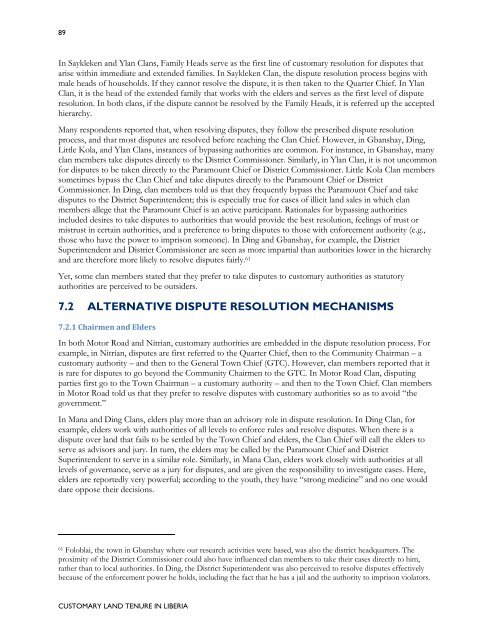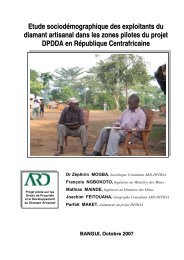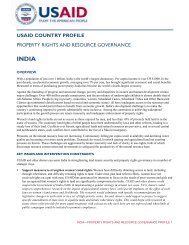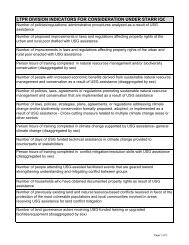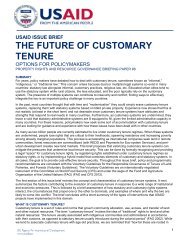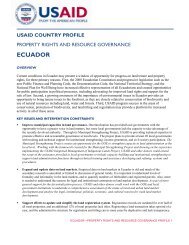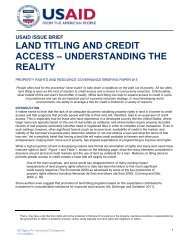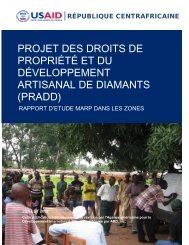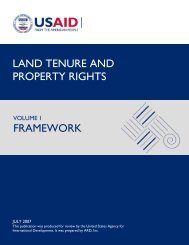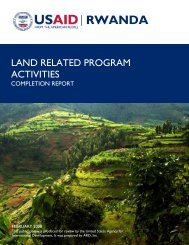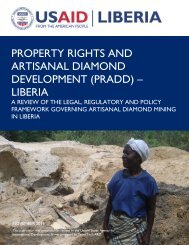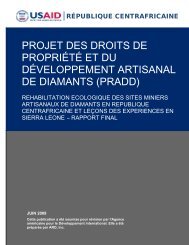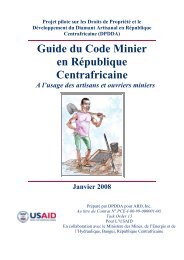Customary Land Tenure in Liberia - Land Tenure and Property ...
Customary Land Tenure in Liberia - Land Tenure and Property ...
Customary Land Tenure in Liberia - Land Tenure and Property ...
You also want an ePaper? Increase the reach of your titles
YUMPU automatically turns print PDFs into web optimized ePapers that Google loves.
89<br />
In Saykleken <strong>and</strong> Ylan Clans, Family Heads serve as the first l<strong>in</strong>e of customary resolution for disputes that<br />
arise with<strong>in</strong> immediate <strong>and</strong> extended families. In Saykleken Clan, the dispute resolution process beg<strong>in</strong>s with<br />
male heads of households. If they cannot resolve the dispute, it is then taken to the Quarter Chief. In Ylan<br />
Clan, it is the head of the extended family that works with the elders <strong>and</strong> serves as the first level of dispute<br />
resolution. In both clans, if the dispute cannot be resolved by the Family Heads, it is referred up the accepted<br />
hierarchy.<br />
Many respondents reported that, when resolv<strong>in</strong>g disputes, they follow the prescribed dispute resolution<br />
process, <strong>and</strong> that most disputes are resolved before reach<strong>in</strong>g the Clan Chief. However, <strong>in</strong> Gbanshay, D<strong>in</strong>g,<br />
Little Kola, <strong>and</strong> Ylan Clans, <strong>in</strong>stances of bypass<strong>in</strong>g authorities are common. For <strong>in</strong>stance, <strong>in</strong> Gbanshay, many<br />
clan members take disputes directly to the District Commissioner. Similarly, <strong>in</strong> Ylan Clan, it is not uncommon<br />
for disputes to be taken directly to the Paramount Chief or District Commissioner. Little Kola Clan members<br />
sometimes bypass the Clan Chief <strong>and</strong> take disputes directly to the Paramount Chief or District<br />
Commissioner. In D<strong>in</strong>g, clan members told us that they frequently bypass the Paramount Chief <strong>and</strong> take<br />
disputes to the District Super<strong>in</strong>tendent; this is especially true for cases of illicit l<strong>and</strong> sales <strong>in</strong> which clan<br />
members allege that the Paramount Chief is an active participant. Rationales for bypass<strong>in</strong>g authorities<br />
<strong>in</strong>cluded desires to take disputes to authorities that would provide the best resolution, feel<strong>in</strong>gs of trust or<br />
mistrust <strong>in</strong> certa<strong>in</strong> authorities, <strong>and</strong> a preference to br<strong>in</strong>g disputes to those with enforcement authority (e.g.,<br />
those who have the power to imprison someone). In D<strong>in</strong>g <strong>and</strong> Gbanshay, for example, the District<br />
Super<strong>in</strong>tendent <strong>and</strong> District Commissioner are seen as more impartial than authorities lower <strong>in</strong> the hierarchy<br />
<strong>and</strong> are therefore more likely to resolve disputes fairly. 61<br />
Yet, some clan members stated that they prefer to take disputes to customary authorities as statutory<br />
authorities are perceived to be outsiders.<br />
7.2 ALTERNATIVE DISPUTE RESOLUTION MECHANISMS<br />
7.2.1 Chairmen <strong>and</strong> Elders<br />
In both Motor Road <strong>and</strong> Nitrian, customary authorities are embedded <strong>in</strong> the dispute resolution process. For<br />
example, <strong>in</strong> Nitrian, disputes are first referred to the Quarter Chief, then to the Community Chairman – a<br />
customary authority – <strong>and</strong> then to the General Town Chief (GTC). However, clan members reported that it<br />
is rare for disputes to go beyond the Community Chairmen to the GTC. In Motor Road Clan, disput<strong>in</strong>g<br />
parties first go to the Town Chairman – a customary authority – <strong>and</strong> then to the Town Chief. Clan members<br />
<strong>in</strong> Motor Road told us that they prefer to resolve disputes with customary authorities so as to avoid “the<br />
government.”<br />
In Mana <strong>and</strong> D<strong>in</strong>g Clans, elders play more than an advisory role <strong>in</strong> dispute resolution. In D<strong>in</strong>g Clan, for<br />
example, elders work with authorities of all levels to enforce rules <strong>and</strong> resolve disputes. When there is a<br />
dispute over l<strong>and</strong> that fails to be settled by the Town Chief <strong>and</strong> elders, the Clan Chief will call the elders to<br />
serve as advisors <strong>and</strong> jury. In turn, the elders may be called by the Paramount Chief <strong>and</strong> District<br />
Super<strong>in</strong>tendent to serve <strong>in</strong> a similar role. Similarly, <strong>in</strong> Mana Clan, elders work closely with authorities at all<br />
levels of governance, serve as a jury for disputes, <strong>and</strong> are given the responsibility to <strong>in</strong>vestigate cases. Here,<br />
elders are reportedly very powerful; accord<strong>in</strong>g to the youth, they have “strong medic<strong>in</strong>e” <strong>and</strong> no one would<br />
dare oppose their decisions.<br />
61 Foloblai, the town <strong>in</strong> Gbanshay where our research activities were based, was also the district headquarters. The<br />
proximity of the District Commissioner could also have <strong>in</strong>fluenced clan members to take their cases directly to him,<br />
rather than to local authorities. In D<strong>in</strong>g, the District Super<strong>in</strong>tendent was also perceived to resolve disputes effectively<br />
because of the enforcement power he holds, <strong>in</strong>clud<strong>in</strong>g the fact that he has a jail <strong>and</strong> the authority to imprison violators.<br />
CUSTOMARY LAND TENURE IN LIBERIA


